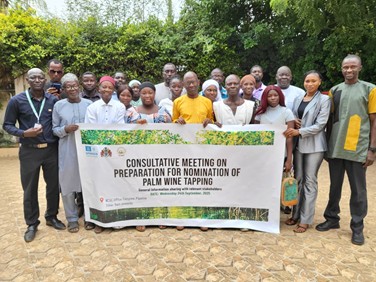
On Wednesday, 24th September 2025, the NCAC convened a stakeholder consultation meeting at its Fajara office to begin preparations for the nomination dossier. The initiative is fully funded by the UNESCO 2003 Convention Secretariat under the Convention for the Safeguarding of Intangible Cultural Heritage.
In 2023, the NCAC completed a Pilot Inventory of Gambian Intangible Cultural Heritage (ICH) with support from UNESCO, working closely with local communities to document cultural elements. Building on that achievement, the NCAC now seeks to have The Gambia join the growing list of UNESCO State Parties with officially recognised ICH practices.
The element selected for nomination, palm wine tapping, is an ancient skill deeply rooted in Gambian cultural life. Beyond producing the popular palm wine, the practice embodies a wealth of traditional knowledge and craftsmanship, including tree climbing techniques, the use of special tools such as the climbing belt, gourd, and sieve, and the artisanal making of these tools. Palm wine tapping also holds social, cultural, and economic significance for many communities across the country.
The stakeholder meeting marked the start of data gathering and consultations needed to build a strong nomination file for submission to UNESCO in 2026.
Participants included nutritionists, representatives of tapper communities, the UNESCO National Commission, researchers, NCAC ICH facilitators, and officials from the National Environment Agency (NEA). Discussions focused on strategies to safeguard not only the palm wine tapping practice but also the trees, associated tools, and traditional skills tied to the craft.
NCAC officials expressed confidence that with community collaboration and expert input, The Gambia can successfully achieve UNESCO recognition for this unique aspect of its intangible cultural heritage.




